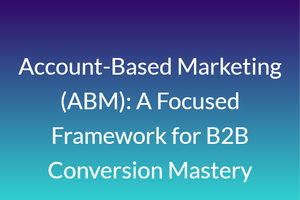Account-Based Marketing (ABM): A Focused Framework for B2B Conversion Mastery
Body
The B2B marketing landscape has evolved from mass outreach to laser-focused strategies, and Account-Based Marketing (ABM) is leading this transformation. Account-Based Marketing (ABM) is a strategic approach where businesses concentrate their marketing and sales efforts on a specific group of high-value accounts, rather than targeting a broad audience.
Defining the Core of Account-Based Marketing (ABM)
At its core, Account-Based Marketing (ABM) treats each selected account as a unique market. This requires a deep understanding of the target company’s business structure, challenges, goals, and the individual decision-makers within it. Instead of generating hundreds of generic leads, ABM focuses on building meaningful connections with stakeholders who are most likely to convert. This means the resources used—whether content, ads, or engagement tactics—are personalized and intentional, producing higher ROI.
Selecting Accounts That Actually Convert
The foundation of Account-Based Marketing (ABM) is built on choosing the right accounts. These aren’t just any leads; they are companies that fit your Ideal Customer Profile (ICP) based on size, revenue, industry, tech usage, location, and buying readiness. With the help of data intelligence and behavior analytics, marketers can discover which companies are actively researching solutions you provide. This insight enables teams to direct their marketing energy toward accounts already showing intent, increasing the probability of conversion.
Personalized Messaging that Hits the Mark
One of the greatest strengths of Account-Based Marketing (ABM) is its ability to tailor messaging for specific roles within a target organization. From the CTO to the head of procurement, every stakeholder has a different concern, and ABM addresses each of them with dedicated content. While a CEO might respond to a case study about ROI, a security manager might appreciate detailed documentation about compliance. Personalized content builds trust, reinforces credibility, and motivates decision-makers to take action.
Building Multi-Channel Engagement Around the Account
Account-Based Marketing (ABM) doesn’t rely on a single platform or channel to connect with prospects. Instead, it creates a synchronized experience across multiple channels such as email, LinkedIn, targeted display ads, personalized landing pages, and even direct mail. The goal is to meet decision-makers where they are—at the right time and through the most effective channel. This omnichannel strategy ensures higher visibility and keeps your brand top-of-mind during the account’s buying process.
Why Sales and Marketing Must Move in Sync
ABM cannot thrive in isolation. It requires full alignment between marketing and sales teams from day one. Both departments must work collaboratively to select accounts, define messaging, assign roles, and establish performance metrics. When marketing provides personalized engagement and sales follows up with contextual conversations, the result is a seamless buyer journey. Regular feedback loops between both teams allow strategies to adapt in real-time, maximizing the impact on each account.
Measuring the Impact of Account-Based Marketing (ABM)
Unlike traditional B2B marketing, where success is measured by lead quantity, Account-Based Marketing (ABM) emphasizes quality and impact. Metrics such as account engagement, time-to-close, pipeline velocity, deal size, and revenue per account are more relevant to ABM campaigns. Marketing automation and CRM tools enable the tracking of multi-touch attribution and stakeholder engagement, offering valuable insights into which tactics are most effective at driving results within each account.
Technology’s Role in Scaling ABM Efforts
Executing a successful ABM campaign without modern tools would be incredibly difficult. Today’s ABM strategies are powered by marketing automation, AI-driven analytics, predictive intent platforms, and CRM systems. These technologies allow marketers to track user behavior, automate content delivery, and trigger personalized interactions based on real-time engagement. With scalable ABM platforms, companies can run personalized campaigns across hundreds of accounts without sacrificing quality or relevance.
Post-Sale ABM: Turning Customers into Advocates
Account-Based Marketing (ABM) doesn’t stop at acquisition—it extends to customer retention and account expansion. By applying the same personalization techniques post-sale, companies can increase upsell, cross-sell, and customer satisfaction. Account-specific insights allow for ongoing engagement, exclusive content offers, and tailored product updates. This ensures that the relationship doesn’t end with the contract signing—it evolves into a long-term partnership that drives mutual value.
ABM Models Fit for Every Business Stage
Account-Based Marketing (ABM) is not limited to large enterprises. Businesses of all sizes can adopt ABM through models that match their resources. Strategic ABM is suitable for high-touch, high-value deals involving deep personalization. ABM Lite works well for mid-tier accounts grouped by similar attributes, while Programmatic ABM allows automated engagement with hundreds of accounts using technology. No matter the model, the focus remains the same—targeted communication with meaningful outcomes.
The Competitive Advantage of Account-Based Marketing (ABM)
In a competitive B2B environment, gaining attention from the right decision-makers is half the battle. Account-Based Marketing (ABM) offers a systematic framework to not only capture that attention but to turn it into action. With personalized outreach, aligned internal teams, multi-channel delivery, and real-time optimization, ABM offers a path to sustainable revenue growth and brand loyalty.
Read the Full Blog Now @ https://acceligize.com/featured-blogs/what-is-account-based-marketing-abm/
About Us
Acceligize is a global B2B demand generation company, specializing in delivering high-quality leads and data-driven marketing solutions for modern businesses. Leveraging AI, content syndication, and targeted outreach strategies, Acceligize empowers B2B organizations to accelerate pipeline growth and increase ROI. As industry leaders in multichannel lead generation, our mission is to help you reach the right audience with the right message at the right time.









Comments